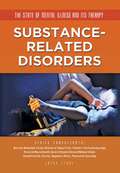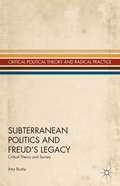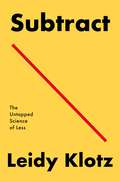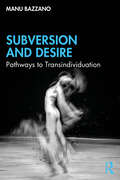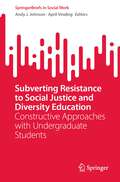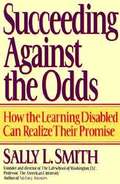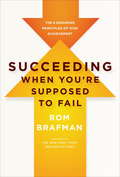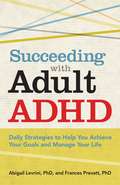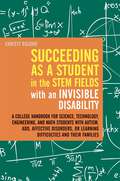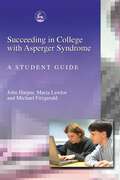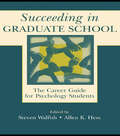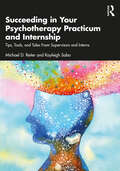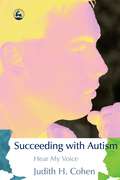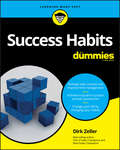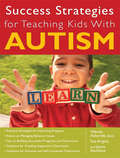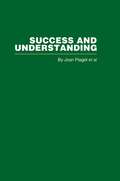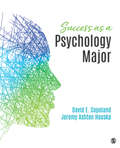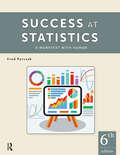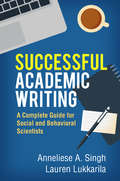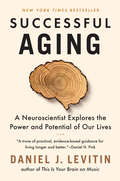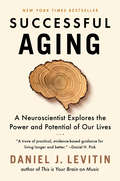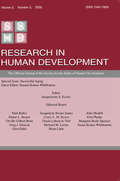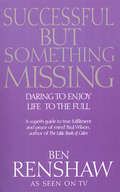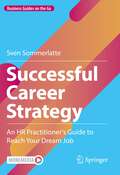- Table View
- List View
Substance-Related Disorders (The State of Mental Illness and Its Ther #19)
by Joyce LibalSubstance-related disorders are among the most prevalent of all mental disorders. They affect people in every part of society, and their consequences can be painful, traumatic, expensive, and even deadly. Furthermore, the negative consequences of substance-related disorders do not only affect the substance user; they touch the lives of the user's friends, family, coworkers, and other relations as well. From caffeine to alcohol, spray paint to cocaine, glue to nicotine, many different chemicals, both legal and illegal, can cause substance-related disorders. With so many substances available for use and misuse, how do you know which substances are addictive? Furthermore, why are they addictive, and what dangers do they pose? This book provides answers to many of these difficult questions. In addition to learning about addictive substances and substance abuse, you will learn about the treatments available for substance-related disorders and how some doctors are using medication to treat drug abuse. Take the first step toward understanding this all-too common category of mental disorders by reading Substance-Related Disorders.
Subterranean Politics and Freud’s Legacy
by Amy BuzbySubterranean Politics and Freud's Legacy seeks to reestablish psychoanalysis as an ally to critical theory's efforts to restore subjectivity and oppose systemic domination in modernity. Given critical theory's ongoing crisis of identity and purpose, this project makes a significant contribution to contemporary political theory.
Subtract: The Untapped Science of Less
by Leidy KlotzBlending evidence across science and design, Subtract: The Untapped Science of Less offers a revolution in problem-solving: proving why we overlook subtraction, and how we can access its true potentialWe pile on “to-dos” but don’t consider “stop-doings.” We create incentives for good behavior, but don’t get rid of obstacles to it. We collect new-and-improved ideas, but don’t prune the outdated ones. Every day, across challenges big and small, we neglect a basic way to make things better: we don’t subtract.Leidy Klotz’s pioneering research shows why. Whether we’re building Lego models or cities, grilled-cheese sandwiches or strategic plans, our minds tend to add before taking away. Even when we do think of it, subtraction can be harder to pull off because an array of biological, cultural, and economic forces push us towards more. But we have a choice—our blind spot need not go on taking its toll on our cities, our institutions, and our minds. By diagnosing our neglect of subtraction, we can treat it. Subtract will change how you change your world. In these pages you’ll meet subtracting exemplars: design geniuses, Nobel Prize-winners, rock-stars, and everyday heroes, who have subtracted to dismantle racism, advance knowledge, heal the planet, and even tell better jokes. These and more guiding lights show how we can revolutionize not just our day-to-day lives, but our collective legacy. A paradigm shift of a book, Subtract shows us how to find more of the options we’ve been missing—and empowers us to pursue them.
Subversion and Desire: Pathways to Transindividuation
by Manu BazzanoThis book presents the importance of subversion in psychotherapy and revaluates the positive role of desire as an integrating force in the individual and collective psyche. The text provides a solid philosophical frame which helps to expand the scope of contemporary psychotherapy at a time when it is being curtailed by a reductionist neoliberal zeitgeist. The latter emphasizes cognition over motivation, behaviour over emotion, consciousness over the unconscious, the self over the organism, and tends to reframe psychotherapeutic practice as a reprogramming of individuals. In response, this book outlines concerted acts of "soft subversion" which can undermine the status quo and open new possibilities of individual and collective transformation. The author also retraces and reassesses some of the more inspiringly subversive legacies in psychoanalysis, with a view to sketching a life-affirming psychology wedded to broadminded political engagement. Covering psychotherapy, politics, art and literature, and social and cultural theory, this book will appeal to anyone interested in understanding how psychotherapy and philosophy can be more radical and subversive endeavours.
Subverting Resistance to Social Justice and Diversity Education: Constructive Approaches with Undergraduate Students (SpringerBriefs in Social Work)
by Andy J. Johnson April VindingThis compact book is constructed using psychological theory and research to empower university faculty to facilitate student engagement and address student resistance to diversity and social justice education more effectively. University faculty teaching diversity and social justice have traditionally encountered various forms of student resistance. Recent cultural trends of political opposition to teaching critical race theory and other forms of increased polarization and scapegoating with decreased levels of social tolerance have exacerbated challenges in promoting student engagement in diversity and social justice education in universities and colleges. In contrast to traditional models that tend to be confrontational in addressing student biases, the new Moving Towards Social Justice (MTSJ), Relational Partnership Development Model (RPDM) and process theoretical models seek to build on appropriate pre-existing strengths, interests, values, and the developmental readiness of students who might otherwise oppose learning about the contexts, lives, and predicaments of marginalized persons living in various intersections of gender, race, ethnicity, national origin, immigration status, sexual orientation, gender identity and ability/disability status. Emphasis is placed on the development of professional and life skills, such as wisdom and intercultural competence, which provide incentives and remove barriers to learning about social justice and diversity. Project-based learning approaches grounded in a developmental framework to foster the thriving and well-being of diverse students, collaborative partners in the community, and diverse persons served by the community partners are emphasized. The role of empirical assessment, feedback, and program refinement over time is also delineated within the models.Subverting Resistance to Social Justice and Diversity Education: Constructive Approaches with Undergraduate Students is an indispensable and timely resource for university and college instructors who teach courses or have significant portions of a class that involve education around social justice, diversity, and intersectionality issues, such as cross-cultural psychology, multicultural psychology, social work, sociology, intercultural communication, and counseling or clinical practice with individuals or families from diverse social locations. University officers of diversity, faculty development providers, and other administrators interested in empowering university faculty to increase student engagement in social justice and diversity education also would find the book a useful reference.
Succeeding Against the Odds
by Sally L. SmithSally Smith has twenty-five years experience educating both children and adults with learning disabilities. In this book she presents practical techniques and inspiring stories that can help individuals with learning problems not only learn how to learn and succeed in school, but learn how to reach their full potential and succeed in life. Through the words of adults whose childhoods were significantly shaped by their problems this book re-creates the experience of the learning disabled and makes their world and their struggle understandable.
Succeeding When You're Supposed to Fail
by Rom BrafmanIN COUNTLESS STUDIES, PSYCHOLOGISTS HAVE DISCOVERED A SURPRISING FACT: For decades they assumed that people who face adversity--a difficult childhood, career turbulence, sudden bouts of bad luck--will succumb to their circumstances. Yet over and over again they found a significant percentage are able to overcome their life circumstances and achieve spectacular success. How is it that individuals who are not "supposed" to succeed manage to overcome the odds? Are there certain traits that such people have in common? Can the rest of us learn from their success and apply it to our own lives? In Succeeding When You're Supposed to Fail, Rom Brafman, psychologist and coauthor of the bestselling book Sway, set out to answer these questions. In a riveting narrative that interweaves compelling stories from education, the military, and business and a wide range of groundbreaking new research, Brafman identifies the six hidden drivers behind unlikely success. Among them: *The critical importance of the Limelight Effect--our ability to redirect the focus of our lives to the result of our own efforts, as opposed to external forces *The value of a satellite in our lives--the remarkable way in which a consistent ally who accepts us unconditionally while still challenging us to be our best can make a huge difference *The power of temperament--people who are able to tunnel through life's obstacles have a surprisingly mild disposition; they don't allow the bumps in the road to unsettle them By understanding and incorporating these strat-egies in our own lives, Brafman argues, we can all be better prepared to overcome the inevitable obstacles we face, from setbacks at work to chall-enges in our personal lives.
Succeeding With Adult ADHD: Daily Strategies to Help You Achieve Your Goals and Manage Your Life
by Abigail Levrini Frances PrevattIf you've been diagnosed with adult ADHD, you are well-acquainted with the procrastination, lack of motivation, and muddled time management that can thwart your best efforts to achieve. You may find yourself constantly distracted, or fear you're about to forget something important. Or you may firmly set a goal for yourself, only to abandon it later in frustration.<p><p> This book will help you overcome the challenges of adult ADHD and find fulfillment in taking the practical steps needed to achieve your goals.<p> In easy-to-master lessons, ADHD specialists Abigail Levrini and Frances Prevatt offer realistic, proven, and unique daily strategies to help you succeed with adult ADHD. Each chapter contains checklists, worksheets, and Start Reading/Stop Reading reminders to help you break down large jobs, such as organizing your space, studying effectively, or listening to your partner, into manageable tasks. You'll learn how to identify the right treatments and support for your lifestyle and find strategies for handling emotional roadblocks such as stress, anxiety, depression, and fear of failure. <p> This dynamic and interactive text will become an indispensable aid in helping you translate your goals into realities to succeed with adult ADHD.
Succeeding as a Student in the STEM Fields with an Invisible Disability: A College Handbook for Science, Technology, Engineering, and Math Students with Autism, ADD, Affective Disorders, or Learning Difficulties and their Families
by Christy OslundThe STEM fields (Science, Technology, Engineering and Math) attract many students with autism, ADD, affective disorders and related invisible disabilities who are highly intelligent and analytical, but who, upon entering higher education, may find that they struggle with independent living and a different way of learning. This is a preparation guide for students and their families that explains everything they need to know about the university experience including classroom behavior, study skills, self-reliance, accessing support services, and when parents should and shouldn't get involved. Offering practical advice and strategies, this is a useful handbook that students can refer to again and again throughout their college years guiding them on their paths to becoming the inventors, scientists, engineers, and computer entrepreneurs of the future.
Succeeding in College with Asperger Syndrome: A student guide
by Michael Fitzgerald Maria Lawlor John HarpurCollege life is particularly stressful for students with Asperger Syndrome (AS) and the resources that colleges provide for such students are often inadequate. This much needed guide provides information to help these students prepare successfully for the rites and rituals of studying, interact with staff and fellow students, cope with expectations and pressures, and understand their academic and domestic responsibilities. How will I cope with the workload? What do I do if I feel ill? How do I make friends and initiate relationships with the opposite sex? Drawing on first hand interviews with AS students and direct clinical experience, the authors address these and many other questions thoughtfully and thoroughly, making practical recommendations. Succeeding in College with Asperger Syndrome demystifies the range of college experiences for students with AS. It is a must for these students, their parents and counsellors alike, providing benefits that will continue throughout the college years and beyond.
Succeeding in Graduate School: The Career Guide for Psychology Students
by Allen K. Hess Steven WalfishPsychology students who want to continue their education today are confronted by a bewildering variety of possibilities. Succeeding in Graduate School offers them much needed practical help. Written by experienced mentors, this book: *explains the options provided by a bachelor's degree, describes what each of the many available programs at the master's and doctoral levels prepares one to do, helps in selecting the most appropriate program, and enhances one's chances of being admitted; *gives reader-friendly tutorials in teaching, research, and clinical/consulting skills; *describes the stresses of life as a graduate student; *suggests ways to cope with the management of difficult professors, the search for the optimal advisor-mentor match, and other political and emotional problems that can make or break a graduate career; *offers advice on overcoming obstacles to completing a thesis or dissertation; and *provides guidance on navigating beyond graduate school: maintaining one's ethical focus, getting into and completing the internship that is a requirement of many programs, obtaining a license for those requiring one to work, and in general, building a career beyond the degree. Clear, crisp, and comprehensive--with extensive references for further exploration--Succeeding in Graduate School is must reading for undergraduates and graduate students alike.
Succeeding in Your Psychotherapy Practicum and Internship: Tips, Tools, and Tales From Supervisors and Interns
by Michael D. Reiter Kayleigh SaboSucceeding in Your Psychotherapy Practicum and Internship is a book about what students can often expect from their psychotherapy internship and how they can make the most of their experience.The book is written from two perspectives—one, that of a seasoned therapist, professor, and supervisor of therapy, and two, the perspective of a registered intern therapist who just went through the internship process. Succeeding in Your Psychotherapy Practicum and Internship covers the basics of psychotherapy internships, from the beginning stages of finding and starting at an internship site, to navigating the common experiences at an internship, to reflecting on therapeutic growth and the ending of an internship, and much more. Students will come away from this book with a deep understanding of each perspective, one that will enhance their appreciation of the practicalities and possibilities of their practicum and internship experiences.
Succeeding with Autism: Hear my Voice
by Judith CohenMichael is a young man who has succeeded in managing his autism and is experiencing success in life despite a diagnosis that might have predicted only disability and despair. He did not talk in early childhood and displayed the classic traits of a severely autistic child, but he has broken out of his silence to help others to learn from his insights and experiences. An explosion of newly diagnosed cases of autism has resulted in a keen interest in the stories of autistic individuals, and many people are touched by knowing a family with an autistic child. This unique book reveals a silent world through the voice of an insightful, articulate young adult with autism. The book also gives perspectives from Michael's family, friends and the professionals who have known him from diagnosis in early childhood through to adult, independent life. After each chapter, the author presents "reflections" that highlight the key issues pertinent to autism and the relevant stage of development. Michael's story is poignant and moving, and provides information and hope to families of autistic individuals and the professionals who work with them.
Success Habits For Dummies
by ZellerDiscover the ultimate success habits for a healthy and prosperous life Whether we like it or not, a big part of what we do in life is governed by habits. Even more importantly, habits can lead us to think and feel in certain patterns. Since habits are so powerful, it's worth paying attention to the ones that are most effective. Inside, bestselling author Dirk Zeller provides tried-and-true advice on creating, building, and cultivating winning habits to achieve success. Success Habits For Dummies is a gold mine of startling insights and practical pointers on achieving success. No matter what your station in life, it can quickly put you on the road to the success you want and deserve. With wit, warmth, and loads of practical wisdom, Dirk Zeller helps you: Discover how habits determine 95% of a person’s behavior Get to know how the people who achieve most in life take deliberate steps to ensure their goals are met Make a practical plan to perform at your maximum potential Maintain a growth mindset that makes you capable of change Everything that you are today, and everything that you will ever accomplish, is determined by the quality of the habits that you form. By creating good habits and adopting a positive behavior, you too can become successful and live a prosperous life.
Success Strategies for Teaching Kids With Autism
by Wendy AshcroftSuccess Strategies for Teaching Kids with Autism - Wendy Ashcroft, PhD, Sue Argiro, Joyce KeohaneThe perfect handbook for any teacher looking for proven solutions for helping children with autism succeedAlthough an abundance of research exists on working with students with autism, teachers need the practical strategies in Success Strategies for Teaching Kids With Autismto build successful programs and services for kids with autism. The authors, seasoned classroom teachers and consultants for a large public school autism support program, look at ways teachers can apply best practices for teaching special needs students on smaller budgets, tight schedules, and minimal materials. They offer more than 25 field-tested ideas for teachers to implement, covering topics such as managing difficult behaviors, teaching social skills, addressing language and communication difficulties, creating schedules, and organizing the classroom. Including teacher-friendly overviews of the educational needs of students with autism and ideal teaching methods, the book also provides reproducible materials that teachers can copy and use immediately in their classrooms, along with photographs and detailed graphics that show their strategies in action. Features proven advice and strategies from experienced special educatorsAddresses the three main areas of need for students with autism: language, social skills, and behavior managementOffers practical solutions to creating an autism-friendly classroomProvides a concise introduction to the educational needs of students with autismIncludes guidance for both inclusion and self-contained classroomsPrufrock Press offers award-winning products focused on gifted, advanced, and special needs learners. For more than 20 years, Prufrock has supported parents and teachers with a wide range of resources based on sound research. The average day of a parent or teacher of a gifted or special needs learner is filled with a thousand celebrations and challenges. Prufrock's goal is to provide practical solutions to those challenges-to provide readers with timesaving, research-based tools that allow them to spend less time on the challenges and more time on the celebrations. Prufrock Press' line of products features:Resources on parenting the special needs learnerSage advice on teaching in the inclusive classroomAdvanced learning tools for gifted children and inquisitive learnersCutting-edge information on innovative teaching approachesResources for college planning for gifted and special needs learnersPrufrock Press is committed to resources based on sound research. It has a senior advisory group composed of the top scholars in the field of education and psychology. All of the company's editors have graduate degrees in education or children's literature, and they all have classroom experience. In essence, when a reader holds a book by Prufrock Press, he or she knows that the information found in that book will be research-based and reflect agreed upon best practices in the field of education and child psychology.
Success and Understanding
by Jean PiagetPublished in the year 2006, Success and Understanding is a valuable contribution to the field of Major Works.
Success as a Psychology Major
by David E. Copeland Jeremy Ashton HouskaSuccess as a Psychology Major, First Edition by David E. Copeland and Jeremy A. Houska is an essential resource for any student interested in pursuing an undergraduate degree in psychology. Built from the ground up with input from hundreds of psychology students, this First Edition answers every question a trepidatious undergraduate may have. Success as a Psychology Major opens with practical tools on how to be a successful student, walks readers through the psychology curriculum, highlights key skills to develop, and presents the various academic and career paths to take after graduation. Unique chapters on joining a research lab, professional organizations and clubs, documenting students' accomplishments, and practical tools for managing time and money provide students with resources they will use throughout their academic career. Presented in a modular format with a student-friendly narrative, this text is a step-by-step road map to a fulfilling and meaningful experience as a student of psychology.
Success as a Psychology Major
by David E. Copeland Jeremy Ashton HouskaSuccess as a Psychology Major, First Edition by David E. Copeland and Jeremy A. Houska is an essential resource for any student interested in pursuing an undergraduate degree in psychology. Built from the ground up with input from hundreds of psychology students, this First Edition answers every question a trepidatious undergraduate may have. Success as a Psychology Major opens with practical tools on how to be a successful student, walks readers through the psychology curriculum, highlights key skills to develop, and presents the various academic and career paths to take after graduation. Unique chapters on joining a research lab, professional organizations and clubs, documenting students' accomplishments, and practical tools for managing time and money provide students with resources they will use throughout their academic career. Presented in a modular format with a student-friendly narrative, this text is a step-by-step road map to a fulfilling and meaningful experience as a student of psychology.
Success at Statistics: A Worktext with Humor
by Fred Pyrczak• This comprehensive text covers all the traditional topics in a first-semester course. • Divided into 67 short sections, this book makes the topics easy to digest. Students regularly get positive reinforcement as they check their mastery with exercises at the end of each section. • Each exercise is based on a humorous riddle. If the answer to a riddle makes sense, students know all their answers for that exercise are correct. If not, they know they need to check their answers. • Short sections make it easy to customize your course by assigning only those sections needed to fulfill your objectives. • A comprehensive basic math review at the end of this book may be used to help students whose math skills are rusty. • Thoroughly field-tested for student interest and comprehension. The short sections and humor-based, self-checking riddles are greatly appreciated by students. • Contains Part D on effect size, which provides technical solutions to issues raised in Part C (such as the limitations of inferential statistics). New to this edition: Section 1: Explains the importance of statistical techniques in the advancement of scientific knowledge. Section 11: Provides practice with the summation operation before using it in multiple statistical tests. Section 27: This section on z-scores explains how to translate a percentile rank into a raw score. Section 30: Underlines the importance of figural representations of data, explains how to identify the most appropriate figure, and discusses how to label figures effectively. Section 41: Provides a deeper understanding of the relationship between p-values and critical values in a statistical test. Appendix J: A summary table of all statistical equations and guidelines for choosing a particular statistical test. Table 1: The format and discussion for the Table of the Normal Curve has been changed to a more conventional presentation of this statistical tool.
Successful Academic Writing: A Complete Guide for Social and Behavioral Scientists
by Anneliese A. Singh Lauren LukkarilaUsing rich examples and engaging pedagogical tools, this book equips students to master the challenges of academic writing in graduate school and beyond. The authors delve into nitty-gritty aspects of structure, style, and language, and offer a window onto the thought processes and strategies that strong writers rely on. Essential topics include how to: identify the audience for a particular piece of writing; craft a voice appropriate for a discipline-specific community of practice; compose the sections of a qualitative, quantitative, or mixed-methods research article; select the right peer-reviewed journal for submitting an article; and navigate the publication process. Readers are also guided to build vital self-coaching skills in order to stay motivated and complete projects successfully. User-Friendly Features *Exercises (with answers) analyzing a variety of texts. *Annotated excerpts from peer-reviewed journal articles. *Practice opportunities that help readers apply the ideas to their own writing projects. *Personal reflections and advice on common writing hurdles. *End-of-chapter Awareness and Action Reminders with clear steps to take.
Successful Aging: A Neuroscientist Explores the Power and Potential of Our Lives
by Daniel LevitinAuthor of the iconic bestsellers This Is Your Brain on Music and The Organized Mind, Daniel Levitin turns his keen insights to what happens in our brains as we age; why we should think about health span, not life span; and, based on a rigorous analysis of neuroscientific evidence, how you can make the most of your seventies, eighties, and nineties today, no matter how old you are now. <P><P>Successful Aging uses research from developmental neuroscience and the psychology of individual differences to show that sixty-plus years is a unique developmental stage that, like infancy or adolescence, has its own demands and distinct advantages. Levitin looks at the science behind what we can all learn from those who age joyously, as well as how to adapt our culture to take full advantage of older people's wisdom and experience. Throughout his exploration of what aging really means, Levitin reveals resilience strategies and practical, cognitive enhancing tricks everyone can do as they age. <P><P>This book is packed with accessible and discussable takeaways, providing great material for reading groups and media coverage. <P><P>Successful Aging inspires a powerful new approach to how readers think about our final decades, and it will revolutionize the way we plan for old age as individuals, family members, and citizens within a society where the average life expectancy continues to rise. <P><P><b>A New York Times Bestseller</b>
Successful Aging: A Neuroscientist Explores the Power and Potential of Our Lives
by Daniel LevitinAuthor of the iconic bestsellers This Is Your Brain on Music and The Organized Mind, Daniel Levitin turns his keen insights to what happens in our brains as we age, why we should think about health span, not life span, and, based on a rigorous analysis of neuroscientific evidence, what you can do to make the most of your seventies, eighties, and nineties today no matter how old you are now. Successful Aging uses research from developmental neuroscience and the psychology of individual differences to show that sixty-plus years is a unique developmental stage that, like infancy or adolescence, has its own demands and distinct advantages. Levitin looks at the science behind what we all can learn from those who age joyously, as well as how to adapt our culture to take full advantage of older people's wisdom and experience. Throughout his exploration of what aging really means, Levitin reveals resilience strategies and practical, cognitive enhancing tricks everyone should do as they age. The book is packed with accessible and discussable takeaways, providing great material for reading groups and media coverage. Successful Aging inspires a powerful new approach to how readers think about our final decades, and it will revolutionize the way we plan for old age as individuals, family members, and citizens within a society where the average life expectancy continues to rise.
Successful Aging: A Special Issue of research in Human Development
by Jacquelynne S. EcclesAs the Baby Boomer cohort moves from middle to later adulthood, it is likely this generation will redefine what it means to age. Growing older will no longer be synonymous with loss and decline. In fact, it is true that the majority of older adults today live fulfilling lives. This special issue discusses ways in which older adults can age successfully—that is—how individuals can maintain their physical and cognitive health, as well as maintain a healthy engagement with life. Also addressed are the universal challenges faced by older adults in their pursuit to age successfully. The objective of this collection is to serve as a stimulus to future research on aging and change in the later years of life. It presents an outstanding array of articles that cover a range of central issues in this area of study. Each author provides a unique insight into the mystery and challenge that awaits us all: the ability to age successfully.
Successful But Something Missing: Daring to Enjoy Life to the Full
by Ben RenshawThis book is aimed at anyone interested in improving and enhancing their quality of life. So often our greatest motivator is to be 'successful' - and we strive mightily to achieve a long list of things - a good job title, a car, a house, a relationship etc. - only to feel disillusioned and empty once we've got them. Ben Renshaw shows how true fulfillment comes from finding a healthy balance between the spheres of mind, body and soul. He explains: *the principles of happiness *the confidence need not be a problem *the art of relationships *how to make you 'vocation your vacation' *that developing a sense of humour is essential With a refreshing honesty - and a thoroughly fresh approach - Ben Renshaw offers many practical solutions, much wisdom and many answers to the questions which most of us ask about our hurried, stressful often baffling lives today.
Successful Career Strategy: An HR Practitioner's Guide to Reach Your Dream Job (Business Guides on the Go)
by Sven SommerlatteAdvancing your career in the best possible way requires a well-structured and targeted approach. This book offers a basic methodology as well as practical tools and a variety of case studies that are helpful for the development and implementation of a career strategy. It helps to match talents with aspirations in order to encourage candidates to make courageous career decisions and offers guidance on how to choose the professional environment that best fits personal preferences. Thus, it can be a guide to considering your career as a lifelong learning journey that can help you grow as a leader and as an individual.The book is primarily aimed at young professionals who want to develop their career in the most effective way. It is also useful for managers to be able to advise and support the professional development of their team members. Videos via app: download the SN More Media app for free, scan a link with play button and access videos directly on your smartphone or tablet.
